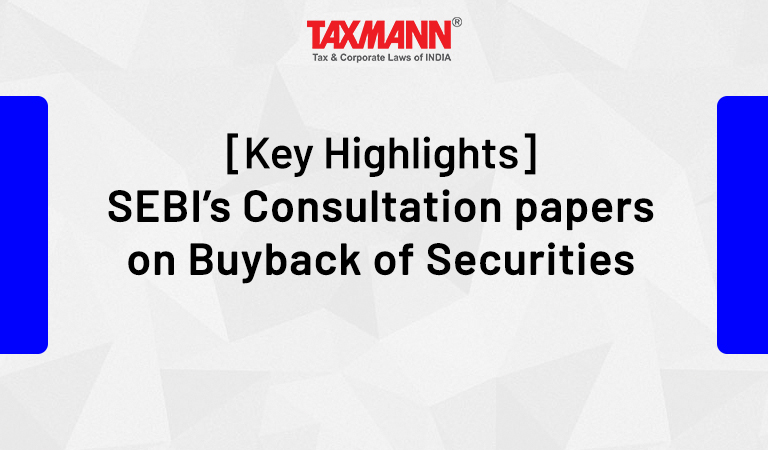[Key Highlights] SEBI’s Consultation papers on Buyback of Securities
- Blog|News|Company Law|
- 3 Min Read
- By Taxmann
- |
- Last Updated on 18 November, 2022

The SEBI has released a consultation paper on the Review of SEBI (Buyback of Securities) Regulations, 2018 whereby it has proposed various changes in existing Buyback norms. Some of the major changes proposed in the paper include a reduction in the maximum limit of buy-back and the time period for buyback under the stock exchange mechanism, enhancement of the limit for Buyback through tender offer route from 25% to 40% in case of buy-back through a tender process, minimum earmarked amount to be utilized for buyback to be enhanced from 50% to 75%, proposal to tax the buy-back in the hands of the shareholders etc. The key highlights of the Consultation papers on the Review of SEBI (Buyback of Securities) Regulations, 2018 are: –
A. Proposals with respect to Open Market Buy-backs through Stock Exchanges
1. Proposal to reduce the maximum buy-back limit and buy-back closure period
As of now, buy-back from open market through stock exchange shall be less than 15 % of the paid-up capital and free reserves of the company. To prevent to trade matching and to ensure equitable treatment, SEBI may reduce the maximum limit.
Also, Buy-back Regulations currently provide a time period of 6 months from the date of opening of the offer for the buy-back offer to be closed.
Since the SEBI was of the view that artificial volume may be created during these 6 months. SEBI has proposed to extend this period for efficient price discovery. Also, the SEBI is planning to launch separate window on stock exchange for undertaking buyback.
2. Proposal to enhance the minimum earmarked amount to be utilized for buyback from 50% to 75%
Presently, the Buy-back Regulations require companies to ensure that at least 50% of the amount earmarked for a buy-back, as specified in the resolution, is utilized. In the event that companies fail to do so, SEBI is permitted to direct the merchant banker to forfeit the amount deposited in an escrow account.
Now, SEBI has proposed to increase this threshold to 75% to prevent companies from announcing buy-backs in cases where there is no real intention to complete the buy-back for the entire amount announced.
3. Buy-back through stock exchanges proposed to be undertaken in respect of frequently traded shares only
For companies whose shares are not frequently traded, it is not possible to implement the pricing restrictions.
Therefore, the SEBI has proposed to restrict option to undertake open market buy- backs through stock exchanges for companies whose shares are frequently traded only.
4. Proposal to put pricing-related restrictions on buy-backs undertaken through the stock exchanges
Currently, there are no pricing-related restrictions specified under the Buy-back Regulations in respect of buy-backs undertaken through the stock exchanges. This used to result in situations where the trading price of the company’s shares is exaggerated by the buy-back. Now, SEBI proposed to restricted companies by:
(a) In any particular day, the company shall not purchase more than 25 % of the average daily trading volume of its shares in the 10 trading days preceding the day in which such purchases are made.
(b) The company shall not participate in first 30 minutes and the last 30 minutes of the regular trading session.
(c) The buy-back price shall not exceed the higher of the
-
-
- highest current independent published bid or
- the last independent sale price reported.
-
Click Here To Read The Full Article
Disclaimer: The content/information published on the website is only for general information of the user and shall not be construed as legal advice. While the Taxmann has exercised reasonable efforts to ensure the veracity of information/content published, Taxmann shall be under no liability in any manner whatsoever for incorrect information, if any.

Taxmann Publications has a dedicated in-house Research & Editorial Team. This team consists of a team of Chartered Accountants, Company Secretaries, and Lawyers. This team works under the guidance and supervision of editor-in-chief Mr Rakesh Bhargava.
The Research and Editorial Team is responsible for developing reliable and accurate content for the readers. The team follows the six-sigma approach to achieve the benchmark of zero error in its publications and research platforms. The team ensures that the following publication guidelines are thoroughly followed while developing the content:
- The statutory material is obtained only from the authorized and reliable sources
- All the latest developments in the judicial and legislative fields are covered
- Prepare the analytical write-ups on current, controversial, and important issues to help the readers to understand the concept and its implications
- Every content published by Taxmann is complete, accurate and lucid
- All evidence-based statements are supported with proper reference to Section, Circular No., Notification No. or citations
- The golden rules of grammar, style and consistency are thoroughly followed
- Font and size that’s easy to read and remain consistent across all imprint and digital publications are applied



 CA | CS | CMA
CA | CS | CMA
